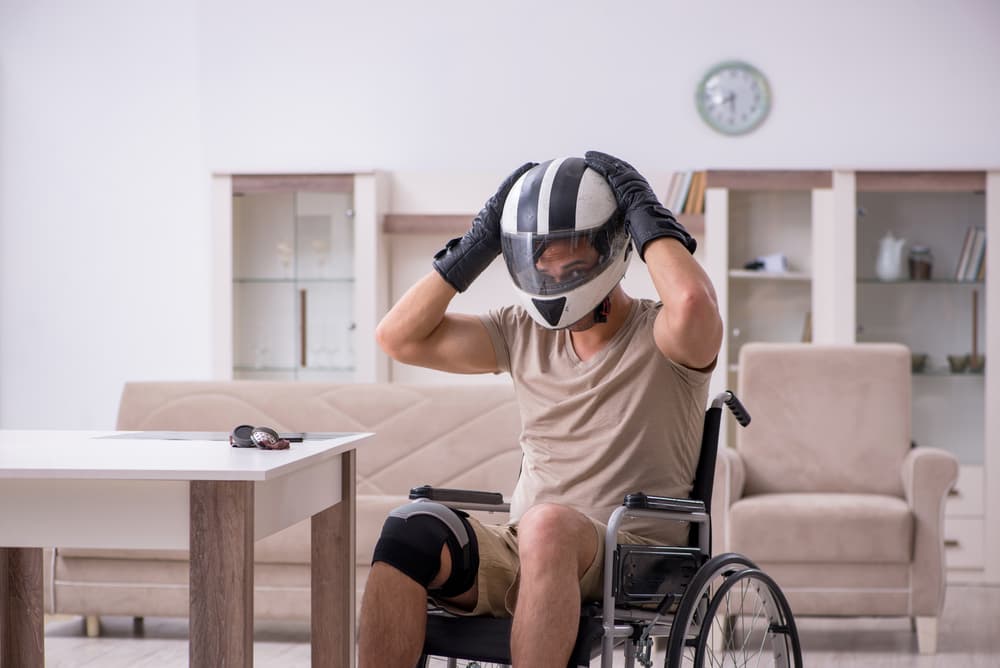If you've suffered an injury in a motorcycle accident that wasn't your fault, you want justice. You're going through a great deal of pain and uncertainty about your financial future. A skilled motorcycle accident attorney can take away your stress so you can focus on the most important thing – recovering as fast as possible.
The following is a look at some steps to obtain the compensation you deserve. Once you take them, you can rest much easier knowing that an experienced lawyer will fight to secure your financial well-being.
Schedule A Free Case Evaluation Today!
Protecting Your Health – The Number One Priority

A motorcycle accident can cause a rush of adrenaline that can mask injuries. You might have come out of the wreck thinking you were not that badly hurt. But if you haven't seen a doctor, you must do so immediately. Some injuries don't show symptoms for days or even weeks afterward.
Delaying medical attention can worsen injuries and lengthen your recovery. Even seemingly minor injuries can have long-term consequences if left untreated.
Seeking medical care will ensure a proper diagnosis, preventing complications.
Beyond your immediate health concerns, however, you need to document your injuries for potential legal reasons.
Keep all your medical records, prescriptions, and bills if you have a significant injury. These documents will serve as crucial evidence for your claim. The more detailed and organized your records, the stronger your case will be. Keep all of the documents together in a safe place.
Follow Your Treatment Plan to the Letter
Schedule consistent follow-up appointments to monitor your progress and adjust your treatment plan if needed. You must do this to ensure your physical recovery and your legal case.
The insurance company covering the at-fault party will use any excuse possible to deny the compensation you deserve. If you don't see a doctor or adhere to medical advice, the insurer will use that against you. They'll likely claim you were not injured in the wreck or had the injury beforehand.
Dealing With Insurance Companies
Carefully review your policy with a car accident lawyer to understand the coverage available. Check to see the limits and any exclusions that might apply. Communicating with your insurance provider will help the claims process move more efficiently.
If the at-fault driver's insurance company has not yet contacted you, they soon will. You mustn't admit any blame to the insurance adjuster. If you do, that will significantly reduce your compensation. You might not receive any money at all.
Hire a Motorcycle Accident Lawyer
In a perfect world, insurance companies do what's right and give injured accident victims the compensation they have coming. Unfortunately, we don't live in that world. You'll need a motorcycle accident attorney to fight for your rights.
Even if your insurance company agrees to pay, the money you receive probably won't cover your medical bills, lost income, property losses, and other damages. The only way to be financially whole is to pursue money from the company covering the at-fault driver.
You must also know that all states have a statute of limitations for personal injury cases. The statute of limitations is a deadline for taking legal action. In some states, the deadline is two years from the accident date. If you do not pursue compensation before the statute of limitations runs out, you'll lose your right to get the money you have coming.
How a Motorcycle Accident Attorney Can Fight the Insurer

We briefly covered what not to do when speaking with an insurance adjuster. An adjuster is a professional whose job is to protect their employer's profit margins. Adjusters will sometimes use questionable tactics to do precisely that. But a motorcycle accident lawyer can keep them from damaging your case.
If you don't have legal help, you might fall into the adjuster's trap. When they call, they'll ask misleading questions designed to trick you into admitting the accident was at least partly your fault. They'll ask to record the conversation and play it back in court, severely hurting your case.
But if you have a motorcycle accident attorney working for you, they'll shield you from adjuster harassment. All you need to do is refer that adjuster to your lawyer.
Other Ways Your Motorcycle Accident Attorney Will Help
Your attorney does more than just protect you from the adjuster. They're like your legal allies, working in several ways to ensure you get what you rightfully deserve.
From digging into the details and gathering evidence to skillfully negotiating and representing you effectively, your attorney is all about maximizing the outcome of your case. They use their know-how to navigate legal complexities, tackle challenges, and stand up for your rights, making a big difference in your journey to fair compensation.
Investigating the Accident
Hiring an attorney will be your best opportunity to gather the evidence needed to win your case. A motorcycle accident lawyer can go to the scene of the wreck to obtain physical evidence, such as pictures of fresh skid marks and damage to guardrails or road signs. These pieces of evidence can show the at-fault driver was speeding or driving erratically.
The reason fast action is essential is that physical evidence can disappear quickly. For example, heavy rain can wash away skid marks. Construction crews can remove damaged signs and replace them.
Your motorcycle accident lawyer can gather other proof that non-attorney can't access. If, for instance, it appears the driver was texting and talking on their smartphone, your attorney can get their phone records.
Also, there's a good chance the wreck occurred near a building with a surveillance camera. Your lawyer can get that footage before the system deletes it or someone tapes over it.
Negotiating With Insurers to Recover Damages
A motorcycle attorney's experience becomes especially crucial when dealing with insurance companies. Skilled attorney use the evidence they gather to negotiate from a position of strength. When they have proof their clients weren't to blame, they can typically convince an insurer to pay a fair settlement.
Experienced attorney know how to negotiate effectively. An attorney can present your case with clarity and confidence, supported by solid evidence. They can also clearly articulate the impact of the accident on your life, emphasizing the physical, emotional, and financial toll it has taken.
If you take legal action, you'll do it to recover the damages mentioned earlier. They fall into two categories: economic and non-economic.
Economic damages are the tangible losses you've suffered due to the accident.
They include:
- Medical expenses
- Lost income
- Property damage
Most attorney have little problem proving economic damages. They can produce bills showing medical expenses, pay stubs showing lost income, and mechanic's invoices showing property damage.
Proving non-economic damages is a different matter. The reason is these are subjective or intangible damages. You can't produce receipts to show your pain and suffering, lost quality of life, and emotional distress. Only a seasoned motorcycle accident attorney can do that.
Going to Court
You might be worried that you'll have to go to court. However, about 95 percent of personal injury cases settle without a trial. It's very likely your motorcycle accident lawyer can negotiate a fair settlement.
But there are instances where an insurance company will refuse to settle. They will rather take their chances in front of a judge or jury. If that happens in your case, your attorney will be ready.
Not only will they have the evidence they gathered, but your motorcycle accident lawyer will also bring in expert witnesses to strengthen your case further.
A skilled accident reconstructionist, for instance, can testify to show how the wreck occurred. A medical professional can explain the extent of your injury to the court and show how much your treatment will cost. A skilled financial expert can show the extent of your lost income and potential economic losses if you can no longer work.
The Trial Process
You should know how the process will work if your case goes to trial.
The following is a look at some of the steps involved.
- Preparation of legal documents – If you and your attorney decide to move forward with a lawsuit, the next step involves the preparation of legal documents. This preparation includes drafting a complaint (outlining the facts of the case), the legal claims you assert, and the relief or compensation you seek. Your attorney will be sure to meet all legal requirements and deadlines.
- Service of process – After filing, the court will issue a summons, and your attorney will serve notice to the at-fault party (the defendant). This involves delivering copies of the complaint and summons and notifying the defendant of the legal action against them. Proper service is critical to ensure due process and fairness in the legal proceedings.
- Response from the defendant – The defendant has a specified period to respond to the lawsuit. They may admit or deny the allegations, and in some cases, they may file counterclaims against you. This stage sets the tone for the legal dispute and begins the formal exchange of information between the parties.
- Discovery phase – The discovery phase involves exchanging information between the parties. Both sides gather evidence, request documents, and may depose witnesses. This process aims to uncover the strengths and weaknesses of each party's case.
- Depositions – Depositions involve sworn testimony outside of court. Witnesses, including you and the defendant, may be questioned under oath. Your attorney will prepare you for the deposition and work to elicit favorable testimony that supports your case.
- Mediation and settlement conferences – The court may encourage or require both parties to attempt mediation or settlement conferences before trial. These alternative dispute resolution methods provide opportunities to resolve the case without a full trial.
- Trial – The case proceeds to trial if the two sides don't settle. Your attorney will present your case, including arguments, witness testimonies, and evidence. The defendant's legal team will do the same. A judge or jury will decide the outcome based on the presented evidence.
Moving Forward With Your Life

Once you complete your case, you'll still face recovering physically and mentally. Follow your doctor's recommended rehabilitation plan. This plan can include physical or occupational therapy or other forms of specialized care. Consistent rehabilitation will increase your chances of regaining your mobility and functionality.
If your injury will likely lead to long-term disabilities, healthcare professionals and other qualified individuals can assist in developing a plan for managing these changes and adapting to them. You may need modifications to your home or assistive devices.
Always keep your emotional recovery in mind as well. Don't hesitate to reach out to friends and family members for emotional support. You may find that discussing your frustrations, fears, and feelings will be therapeutic, helping you navigate the emotional challenges you face.
Community resources and support groups can also help. Connecting with those going through the same thing can also aid your recovery.
Try to focus on life after your accident. Embrace life to the fullest, setting realistic goals and celebrating achievements. Surround yourself with positive influences. While the journey will be challenging, you can face it with determination and a supportive network.
Speak With a Motorcycle Accident Lawyer to Protect Your Rights

Please don't try to fight the insurance companies on your own. They have too many resources, including experienced legal teams regularly defeating unrepresented accident victims. If you choose to go it alone, you'll have virtually no chance of winning. You'll face the daunting task of paying for all your damages out of pocket.
A skilled San Diego personal injury lawyer will handle all the legal hassles so you can rest and recover. They'll alleviate your stress and fight to ensure you receive every dollar you deserve. Hiring an attorney will be one of the best decisions you'll ever make for your future and your family.

